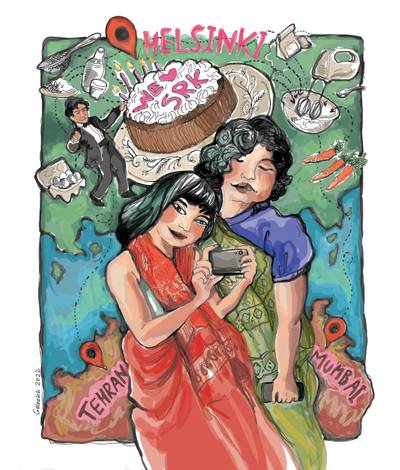

A couple of weeks ago, we were chatting about being upfront, and I said that I too want to be like that - ‘upfront and take it on the chin’. E responded, “Yes, you should do that, I’ll support you.” Imagine two women killjoying their way into work and life, aha, the joy!
READEditorial / December 2021
Elham Rhmati reflects on difficult challenges alongside moments of immense joys in NO NIIN’s first year of publishing; and Vidha Saumya on the the buoyant nature of confrontation in friendship.
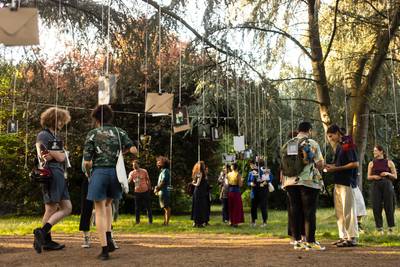

Mishandled Archive started in 2017 when Tara Fatehi Irani dispersed an archive of family photographs and documents in public places and created a dance at the site of each dispersal–once a day for a whole year. This led to the creation of a new archive of 365 photographs and dance scores, a performance-installation and a book. In summer 2021, Tara presented the first outdoor performance of Mishandled Archive. She invited poet Nisha Ramayya to attend this performance and write a response to it –to write around and through the performance and its themes, to create a text that thinks with this performance and allows its readers an alternative way into the project.
READChoreographing Dissonance: A Response to Mishandled Archive
On creative methods of daily storytelling through working with unofficial, unpublished, and neglected histories using the archive of family photographs and documents in public places.
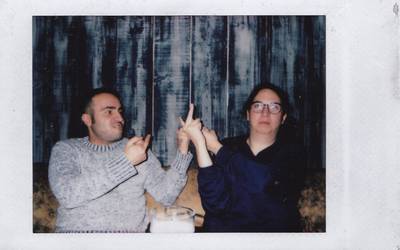

How is it expected of artworkers without access to employment security and no business background to be able to sustain their organizations and initiatives once their grant runs out? Could funding bodies come together to create the possibility of dialogue, the sharing of experiences, and the development of a body of knowledge and toolsets around the topic of post-funding survival and economic sustainability for the initiatives they fund? Or at least create a space for questioning and analysing these futures?
READTaidekirppis: What Happens When an Archive-Based Project Ends Prematurely?
Andrea Coyotzi Borja, Farbod Fakharzadeh on the perils of short-term funding and the cycles of affirmation, abandonment, despair, and continuation it propels.
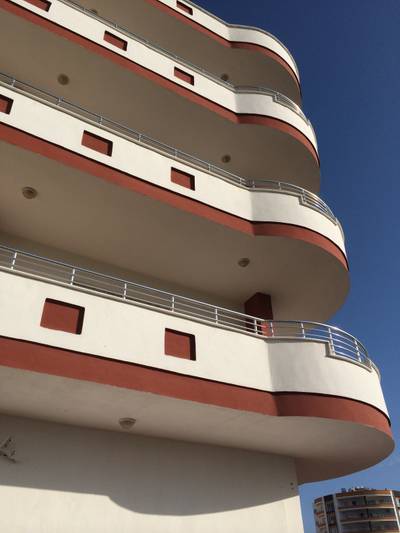

To find yourself in a new Syrian school, established in a residential building in Turkey, that teaches the Libyan curriculum to freshly-arrived Syrians, makes you want to tell stories about it.
READTemporary Peace
Shahi Derky’s poignant text about leaving Syria, seeking refuge in different places, and the unending exile of figuring things out, remembering many pasts, and imagined futures.


For the past year, I have been teaching the course “Decolonise your Studies” at Aalto University with Kiia Beilinson. Settling on this title was an effort to inspire action, despite believing it’s not really possible to decolonise academia. Teaching the course filled me with feelings of inadequacy and doubt. How can we make sure this course does its name justice, especially in a colonial country like Finland that is still oppressing Sámi peoples’ rights? Are we only playing into an empty buzzword culture that is actually damaging to indigenous rights? How can we justify teaching this course at a university, with its structures of institutional violence?
READOn the Limits and Possibilities of Decolonising Universities
Prompted by the feelings of inadequacy when teaching “Decolonise your Studies”, Miia Laine reflects on her experiences with decolonial work at three universities in Germany, the UK and Finland.
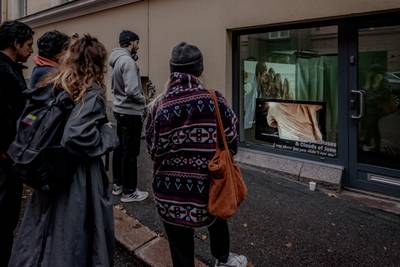

A review on ‘Sarajevo Roses and Clouds of June’ exhibition by Samra Šabanović and Sheung Yiu at Third Space, Helsniki.
READThe (Un)disputed Portrait of the Middle-Class
Fjolla Hoxha reviews ‘Sarajevo Roses and Clouds of June’ an exhibition about what photography exposes in terms of socio-political relationships within the hegemony of the power structures that reign us.
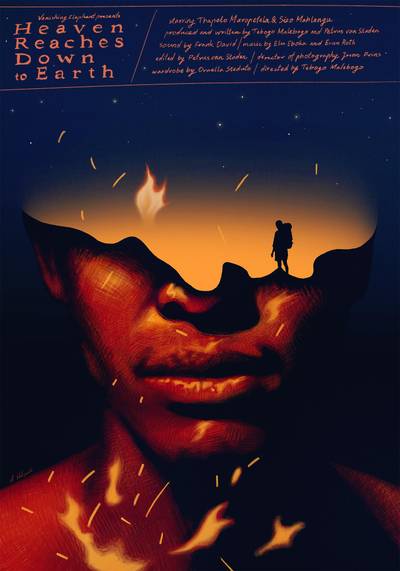

As one of the central themes of HIFF this year, a diverse selection of African films took Finnish audiences across the culturally rich continent and into the vast imaginations of African filmmakers. The eclectic selections were further complimented by the five extraordinary short films chosen for the African Express – Short Station. Each of these short films was able to deliver a wealth of human experiences in under 30 minutes of cinematic splendor.
READAfrican Cinema Takes Center Stage
Sharron L. Todd reviews African Express Short Films screened at the 34th Helsinki International Film Festival and why it has an elevated impact on the festival.


‘Bliss’ (2021), written and directed by Henrika Kull, stars Adam Hoya and Katharina Behrens. The film follows a relationship between Maria (Hoya) and Sacsha (Behrens), two women who meet each other while employed as sex workers in the same brothel in Berlin.
READBliss: With a Light Touch, With a Tender Gaze
Amanda Hunt’s review of Henrika Kull’s film ‘Bliss’.


Lan Yu is a story about a melodramatic love affair between an architecture student, Lan Yu, and a wealthy businessman, Han Dong. They keep on finding each other throughout the years till time runs out.
READLan Yu: Attraction of Opposites; Between Symbolism in Beijing Comrades
Yilin Ma’s review of Stanley Kwan’s film ‘Lan Yu’.


Apples takes place during a fictional pandemic that erases people’s memories on a random basis. Such is the case of the main character, Aris, who is struck by oblivion while riding the bus. Once a person has forgotten, they are taken to the hospital and usually claimed by their loved ones. When nobody comes looking for Aris, he is enrolled in a reintegration programme where he is given the task of performing various activities and documenting them in photographs.
READApples: The fragility of identity constructs


Our Western popular culture is youth-obsessed and having elderly people as main characters is a rare sight. And when it comes to queer representation in cinema, there aren’t enough lesbian movies. A movie about lesbian elderly women? Well, definitely there isn’t enough of those either, and that makes Two of Us, a French film written and directed by Italian director-writer Filippo Meneghetti, a welcomed yet flawed addition to queer representation.
READTwo of Us: On Ageing Queer Love & Aged Queer Stereotypes
Isa Komsi’s review of Filippo Meneghetti’s film ‘Two of Us’


The following creative review is inspired by the theatre event entitled “Undertone: a Proposal for Legal Loitering”, an all-night-long amalgam of performances from 08 pm - 05 am that took place in Tiivistämö on November 27th of 2021. The show was put together by a group of creative associates that were convened by Geoffrey Erista. The show expresses the subcultures of electronic music and the ballroom scene, all the while paying tribute to the active creation of safe spaces.
READTransformations: The Secret Worlds Inside Baltic Circle Festival's "Undertone"
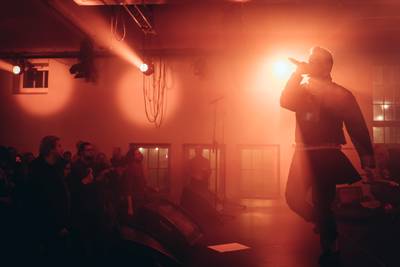

It is high time more events happened in Helsinki, led by Indigenous peoples. In this way, the venue naturally becomes a place of belonging, a place where attendees free themselves by just following their own rhythm while speaking up for care towards nature and acknowledging the need to have a night diverse in identities, languages, and musical traditions.
READDarkness Into Flashing Rhymes: Ailu Valle and DJ Uyarakq’s Opening Night Club at the Baltic Circle Festival


MATA is a story situated in the Amazon, one that is true, topical and impactful. As MATA is a story, the review will also start as a story.
READMATA: Not a Forest, but a Killer Field
Riina Rastas reviews ‘MATA’ a documentary film about industrial land use impact on climate change and the indigenous peoples’ attempt to protect their land.


Fionde’s story is based on four central elements, which are firmament (represented by the balloons), desert (place), wind (sound) and stars (lights). I have built my review using these elements as titles for each section.
READFIONDE: Unbinding the lost play within us


All I’m saying is, I want equity, I also want space; I want to use technology for my neuro-hacking and biohacking to affirm my gender-pro-choice. I’ll have what he’s having please. Until I reclaim my basic human rights, I resist the binary, refuse the insufficient status quo.
READEjaculation Falls: A Queer Diasporic Review
Vishnu Vardhani Rajan on resisting the binary and refusing the insufficient status quo.
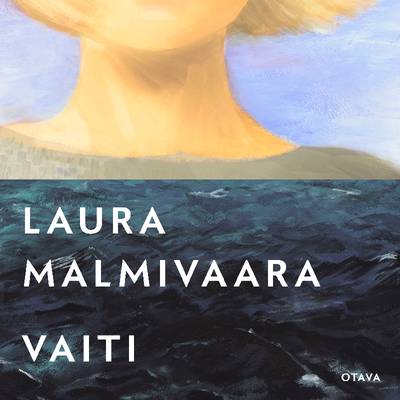

Perhaps the most troubling aspect of cancel culture is that it almost always focuses on individuals. This might not be the initial purpose – when actresses came out with stories of abuse by Louhimies, they were discussing the Finnish film industry and how it glosses over abusive behavior as much as he does.
READNoise: A Review of Vaiti by Laura Malmivaara
On the contradiction between the culture of silence and the MeToo movement in Finland.
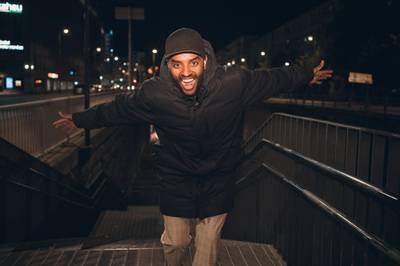

I’m so tired of seeing depressing African films about slavery and civil wars; about suffering. And though I wanted to address an issue like the health crisis in Africa, I wanted to tell it through love.
READKhadar Ahmed: The King of "No"
Sharron L. Todd in conversation with Khadar Ahmed on deciding his own future, despite the societal odds stacked against him.


Even though we met for the first time, Rita was keen on opening up to talk about a variety of subjects. We talked about many things, stopping longer on the role of Renaissance in Rita’s current art practice, her PhD on artists-in-residence, the latest exhibition in Myymälä 2 and the invisibility of foreign artists in Finland.
READA fragment of a landscape, an iceberg, or something else entirely: Conversation with Rita Vargas
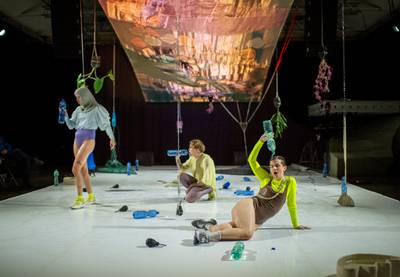

On the eve of the day view of Deep Time Trans (DTT), the latest project by the DTT working group, I sat with two members of this collective of artists to discuss queer ecology, queer futures, and transformation.
READDeep Time Trans, a Lookinglass Into Prehistoric Queer Ecology: Conversation With Even Minn and Teo Ala-Ruona


The starting points of this work were related to relaxation and finding one’s own space. The picture has direct and indirect hints from which you can deduce the soundtrack of the illustration.
READWhat Would I Rather


Sam Hultin introduces the listener to Eva-Lisa, Transvestia, and Sam’s project, Eva-Lisa’s Monument. In the project, which consists of guided walking tours, collective readings, and anniversaries, Sam invites today’s trans community to activate the archive that Eva-Lisa created during her life as an activist and that Sam took over after Eva-Lisa’s passing.
READEva-Lisa’s Monument: Caring for the Archive of a Trans Pioneer
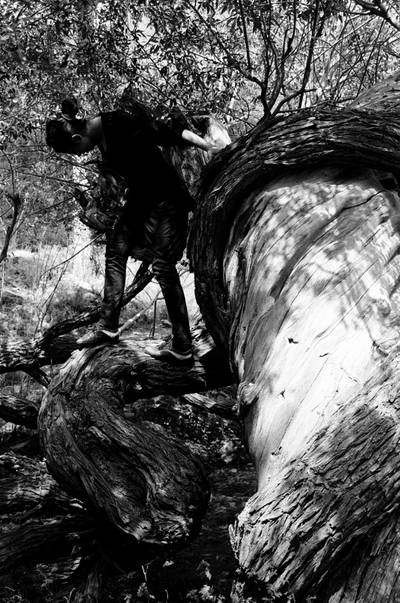

But what if I am comfortable in my own space? What if I don’t want to defy the impossible and all I want is to achieve my goals peacefully? Why should I compete fiercely with others to achieve my aims?
READOrdinary Life
